Paul's Quest Completed
 On the route to Jerusalem Paul stays with fellow believers in Christian communities. This act has a two-fold purpose, to encourage them in what he considers his final days and for protection from those who would kill him before he is able to complete his quest. He is well received by all believers which speaks highly of his character. He also receives a warning from the Spirit, delivered by every believer he greets, that nothing good awaits him in Jerusalem.
On the route to Jerusalem Paul stays with fellow believers in Christian communities. This act has a two-fold purpose, to encourage them in what he considers his final days and for protection from those who would kill him before he is able to complete his quest. He is well received by all believers which speaks highly of his character. He also receives a warning from the Spirit, delivered by every believer he greets, that nothing good awaits him in Jerusalem.
7 Sons of Sceva
 Acts 19.11-2 is a passage that disturbs a lot of Christians. It discusses a practice that was very common in the first century but that is rarely heard of outside of horror movies today. Demonic possession. The very topic of demons and demonology is usually met with raised eyebrows, especially from those outside the family of Jesus. It is met with the same incredulity as fairytales. Yet the bible makes it clear that such entities exist and that at least some of them can possess, or at the very least oppress, humans.
Acts 19.11-2 is a passage that disturbs a lot of Christians. It discusses a practice that was very common in the first century but that is rarely heard of outside of horror movies today. Demonic possession. The very topic of demons and demonology is usually met with raised eyebrows, especially from those outside the family of Jesus. It is met with the same incredulity as fairytales. Yet the bible makes it clear that such entities exist and that at least some of them can possess, or at the very least oppress, humans.
Paul's Victorious Completion
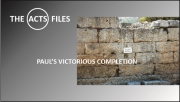 After ministering in Corinth for half a year the Jews were at wits end with Paul (Acts 18.12-.23). Luke describes their arrest of Paul as an ”attack” to assure we understand that brutality was involved. After his beat down they brought him before Gallio the proconsul of their region in hopes of his consent to a state execution. The Romans, however, were never anxious to enter the affairs of the Jews and this situation was no different.
After ministering in Corinth for half a year the Jews were at wits end with Paul (Acts 18.12-.23). Luke describes their arrest of Paul as an ”attack” to assure we understand that brutality was involved. After his beat down they brought him before Gallio the proconsul of their region in hopes of his consent to a state execution. The Romans, however, were never anxious to enter the affairs of the Jews and this situation was no different.
Paul in Athens
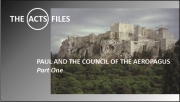 Not being a lay-about, Paul made good use of his time waiting for Silas and Timothy to catch up to him in Athens (Acts 17.16-.20). He conducted a reconnoiter of the great city and in doing so we are treated to a depiction of the culture of ancient Athens.
Not being a lay-about, Paul made good use of his time waiting for Silas and Timothy to catch up to him in Athens (Acts 17.16-.20). He conducted a reconnoiter of the great city and in doing so we are treated to a depiction of the culture of ancient Athens.
The Fall and Raising of Eutychus
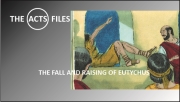 The beginning of Acts 20 reveals Paul’s travel plans. Instead of sailing home, he decided to travel across the province of Asia due to a plot against his life. While this was a new plan to kill Paul, it is uncertain if this is a new threat or the same band of Jews who plotted against him in Acts 9.20. It may be that there was a small band of Jews who had no problem taking the law into their own hands. This is more likely than a band of assassins, who would have easily caught up to Paul in Corinth where he stayed for several years, or even Greece where he taught for several months. While they were certainly committed, they were clearly not well funded or connected.
The beginning of Acts 20 reveals Paul’s travel plans. Instead of sailing home, he decided to travel across the province of Asia due to a plot against his life. While this was a new plan to kill Paul, it is uncertain if this is a new threat or the same band of Jews who plotted against him in Acts 9.20. It may be that there was a small band of Jews who had no problem taking the law into their own hands. This is more likely than a band of assassins, who would have easily caught up to Paul in Corinth where he stayed for several years, or even Greece where he taught for several months. While they were certainly committed, they were clearly not well funded or connected.
Ephesus: City of Opportunity
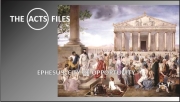 Paul and Apollos probably passed each other on the road without knowing it. When Apollos set off for Corinth from Ephesus, Paul was heading to Ephesus on his third missionary journey. Upon his arrival Acts 19.1-.10) Paul found a group who were in the same position as Apollos had been in, that is they knew of Jesus only up until the time of the death of John the Baptist. These former disciples of John (of which there were a dozen) left Jerusalem and settled in Ephesus. Just as Aquilla and Priscila completed Apollos’ knowledge of the Messiah, so Paul took the disciples of John under his tutelage.
Paul and Apollos probably passed each other on the road without knowing it. When Apollos set off for Corinth from Ephesus, Paul was heading to Ephesus on his third missionary journey. Upon his arrival Acts 19.1-.10) Paul found a group who were in the same position as Apollos had been in, that is they knew of Jesus only up until the time of the death of John the Baptist. These former disciples of John (of which there were a dozen) left Jerusalem and settled in Ephesus. Just as Aquilla and Priscila completed Apollos’ knowledge of the Messiah, so Paul took the disciples of John under his tutelage.
Paul in Corinth
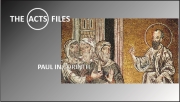 We don’t know how long Paul stayed in Athens after his presentation to the Areopagus council, but we do know that one member of the council came to faith is Jesus. Along with Councilman Dionysius and a prominent woman named Damarius, others also put their faith in Jesus. While Luke doesn’t tell us how many others, the language appears to imply that the “others” who followed were of the political camp or household of the two who were named.
We don’t know how long Paul stayed in Athens after his presentation to the Areopagus council, but we do know that one member of the council came to faith is Jesus. Along with Councilman Dionysius and a prominent woman named Damarius, others also put their faith in Jesus. While Luke doesn’t tell us how many others, the language appears to imply that the “others” who followed were of the political camp or household of the two who were named.
Paul in Berea
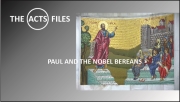 Once more in fear of mortal danger Paul, Silas and Timothy set out at night to the city of Berea (Acts 17.10-15). No doubt other’s accompanied them as well, as traveling at night was very dangerous. Upon their arrival Paul continued his pattern and first went to the city’s synagogue to teach the Jews about the Messiah. Paul had not yet found a new method for reaching the Europeans. The church is Thessalonica was mostly made of Gentiles (1 Thessalonians 1.9) and this would likely continue as he pushed farther from Jerusalem. What he found in Berea was surprising.
Once more in fear of mortal danger Paul, Silas and Timothy set out at night to the city of Berea (Acts 17.10-15). No doubt other’s accompanied them as well, as traveling at night was very dangerous. Upon their arrival Paul continued his pattern and first went to the city’s synagogue to teach the Jews about the Messiah. Paul had not yet found a new method for reaching the Europeans. The church is Thessalonica was mostly made of Gentiles (1 Thessalonians 1.9) and this would likely continue as he pushed farther from Jerusalem. What he found in Berea was surprising.
Ephesian Revival
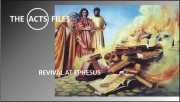 The effect the brutalization of the sons of Sceva was greater than all the sermons that have ever been preached. Luke tells us that the event became known far and wide in Ephesus causing a great fear and also a great lifting up of the name of Jesus. Many who had been practicing the occult in secret came forward to confess and to leave it behind. They brought with them their scrolls and grimoires and burned them publicly.
The effect the brutalization of the sons of Sceva was greater than all the sermons that have ever been preached. Luke tells us that the event became known far and wide in Ephesus causing a great fear and also a great lifting up of the name of Jesus. Many who had been practicing the occult in secret came forward to confess and to leave it behind. They brought with them their scrolls and grimoires and burned them publicly.
Apollos
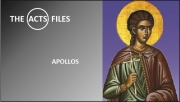 With Paul on his way back to Antioch Syria the story briefly shifts focus on the activity in Ephesus, where Priscila and Aquilla set up their business. Here we are introduced to a man named Apollos. Born to Jewish parents in Alexandria, Egypt he was raised with a cosmopolitan education. The world famous Library of Alexandria was the home of some of the oldest manuscripts, teachings and documents from around the globe. While we know much about the education of Paul, we must make assumptions about Apollos.
With Paul on his way back to Antioch Syria the story briefly shifts focus on the activity in Ephesus, where Priscila and Aquilla set up their business. Here we are introduced to a man named Apollos. Born to Jewish parents in Alexandria, Egypt he was raised with a cosmopolitan education. The world famous Library of Alexandria was the home of some of the oldest manuscripts, teachings and documents from around the globe. While we know much about the education of Paul, we must make assumptions about Apollos.
Paul in Athens, Part 2
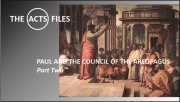 Paul stands before the council of the Areopagus (Acts 17.22-.31) and gives his opening remarks about his belief system. Throughout the speech we see evidence of Paul’s cleverness and command of the Greek language. Take the back-handed compliment he gives his listeners in his very first statement for example. He states that he has observed they are a very “religious” people. The Greek word translated religious can be interpreted as “devout” (a compliment) or as “superstitious” (an insult).
Paul stands before the council of the Areopagus (Acts 17.22-.31) and gives his opening remarks about his belief system. Throughout the speech we see evidence of Paul’s cleverness and command of the Greek language. Take the back-handed compliment he gives his listeners in his very first statement for example. He states that he has observed they are a very “religious” people. The Greek word translated religious can be interpreted as “devout” (a compliment) or as “superstitious” (an insult).
Paul in Thessalonika
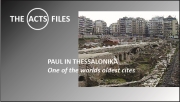 When Paul arrived at Thessalonica (Acts 17.1-.9) he entered a city with a rich history. While an exact date of the cities founding is hard to come by, in 168 BC it became the capital of the second district of Macedonia. Located at the intersection of two important Roman roads (one from Italy and another from the Danube River to the Aegean Sea) it became the capital city of all of Macedonia in 146 BC. The cities importance to Rome became incalculable shortly before the birth of Jesus and continues to this day to be the second greatest city in all of Greece.
When Paul arrived at Thessalonica (Acts 17.1-.9) he entered a city with a rich history. While an exact date of the cities founding is hard to come by, in 168 BC it became the capital of the second district of Macedonia. Located at the intersection of two important Roman roads (one from Italy and another from the Danube River to the Aegean Sea) it became the capital city of all of Macedonia in 146 BC. The cities importance to Rome became incalculable shortly before the birth of Jesus and continues to this day to be the second greatest city in all of Greece.
